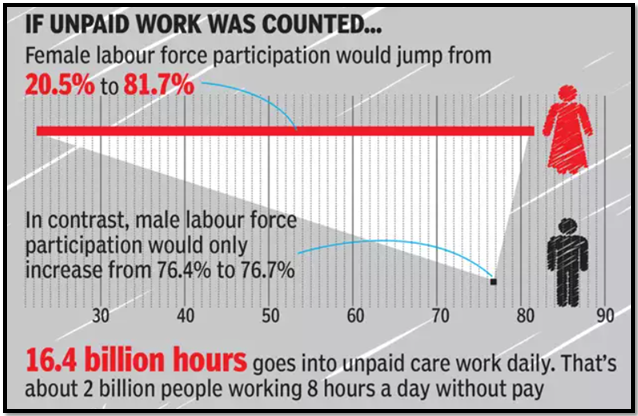Q. Critically examine the prevalent paradigm of economic theory and its impact on social organizations, particularly families. Discuss the need for a paradigm shift towards valuing caregiving and creating genuine “social” enterprises.
| Structure of Answer
Introduction · Briefly explain prevailing paradigm of economic theory,, commonly known as neoclassical economics Body · Mention Neoclassical Economics both Positive and negative Impacts on Social Organizations with examples · Mention Need for a Paradigm Shift Valuing Caregiving and Genuine Social Enterprises with examples Conclusion · Mention need of valuing caregiving and creating genuine social enterprises is essential for building more just, equitable, and sustainable societies. |
Answer-
The prevailing paradigm of economic theory,, commonly known as neoclassical economics, has faced criticism for its limited emphasis on market efficiency, often neglecting the broader social and environmental aspects of economic activity. This narrow focus has had a notable influence on social structures, particularly within families, where the crucial contribution of caregiving is undervalued, with a preference for prioritizing paid employment over unpaid care responsibilities.
Neoclassical Economics Impacts on Social Organizations
Positive Impacts
- Economic Growth and Development: Neoclassical economics has contributed to substantial economic growth, leading to improved living standards and access to resources for many families. Example: India’s economic liberalization in the 1990s, influenced by neoclassical principles, spurred economic growth and lifted many families out of poverty.
- Innovation and Technological Advancement: The focus on market-driven solutions in neoclassical economics has incentivized innovation and technological progress. Example: The rise of information technology and the digital economy has created new opportunities for families and businesses globally.
Source: Times of India
- Efficient Resource Allocation: Neoclassical economics promotes efficient resource allocation, ensuring that resources are directed towards their most productive uses. Example: Market forces guiding the allocation of resources in agriculture have led to increased productivity and improved livelihoods for farming families.
- Individual Economic Freedom: Neoclassical economics champions individual economic freedom, allowing families to make choices based on their preferences and needs. Example: The growth of entrepreneurship provides families with opportunities to create and manage their businesses independently.
Negative Impacts
- Income Inequality: Neoclassical economics has been associated with widening income inequality, creating disparities within and between families. Example: According to a 2022 report by Oxfam, the richest 1% of Indians own more than 40% of the country’s wealth, while the poorest 50% own less than 3%.
- Undervaluing of Unpaid Labor: The emphasis on market-driven productivity undervalues unpaid labor, particularly caregiving responsibilities, leading to the marginalization of these contributions
- Environmental Degradation: Neoclassical economics’ focus on growth can lead to environmental degradation, impacting the well-being of families through pollution and resource depletion. Example: rapid industrialization in regions like Delhi, where air quality poses health risks to families.
- Short-Term Profit Orientation: Neoclassical economics can prioritize short-term profit over long-term societal well-being, leading to decisions that may harm families in the long run.
Need for a Paradigm Shift Valuing Caregiving and Genuine Social Enterprises
- Recognizing the Economic Value of Caregiving: Acknowledge caregiving’s economic significance to provide proper recognition and support. Example: Programs like the Mahatma Gandhi National Rural Employment Guarantee Act (MGNREGA) in India, which includes provisions for rural caregiving activities, showcase the importance of recognizing unpaid labor.
- Financial Support for Caregivers: Governments and employers should provide financial support for caregivers to alleviate economic burdens. Example: Sweden’s policies on parental leave and subsidized childcare contribute to a supportive environment for caregivers.
- Promoting Equitable Division of Caregiving Responsibilities: Policies promoting a more equitable division of caregiving responsibilities between genders are essential for gender equality. Example: Iceland’s emphasis on shared parental leave encourages fathers to take an active role in caregiving, fostering a more balanced division of responsibilities.
- Redefining Success for Businesses: Encourage businesses to redefine success beyond profit maximization, emphasizing social and environmental responsibility. Example: The B Corp movement, where companies commit to social and environmental performance alongside profits, showcases a shift towards responsible business practices.
- Collaboration for Social Impact: Promote collaboration between businesses, non-profits, government agencies, and community groups to address social and environmental challenges. Example: The partnership between Tata Trusts and Google in India to provide rural women with digital skills demonstrates collaboration for positive social impact.
A paradigm shift towards valuing caregiving and creating genuine social enterprises is essential for building more just, equitable, and sustainable societies. By recognizing the essential role of caregiving and providing support for caregivers, and by encouraging businesses to adopt a more social purpose, we can create a world where everyone has the opportunity to thrive.

 Source: Times of India
Source: Times of India


